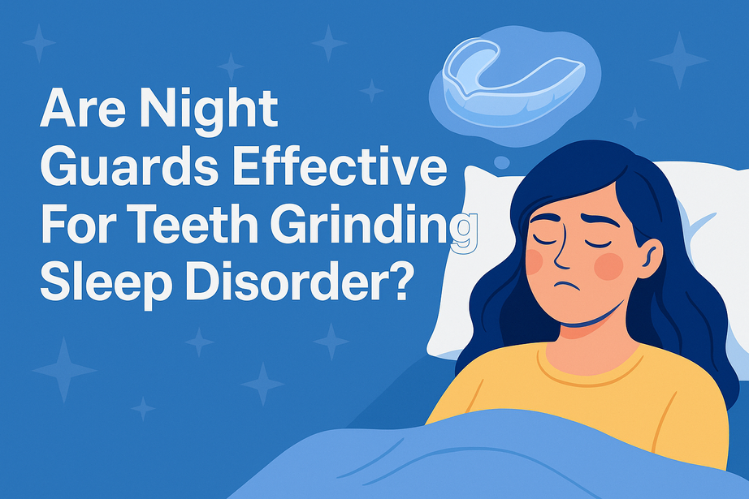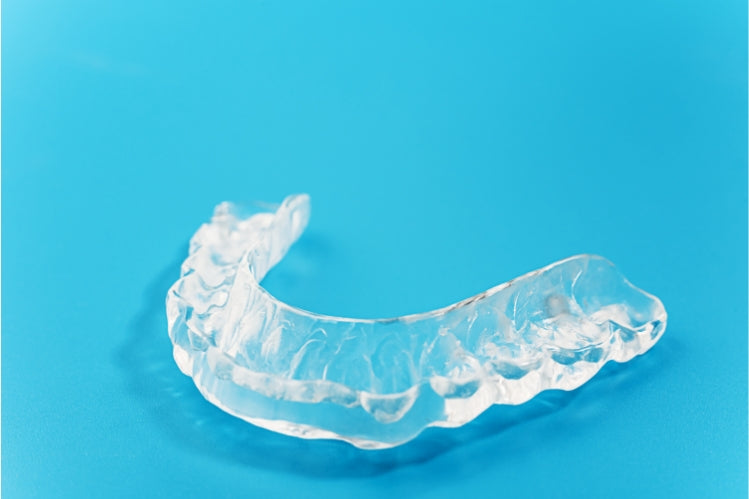
Bruxism is one of the most common dental problems. If you often wake up with morning headaches, it could be due to nighttime teeth clenching. This blog will help you understand what bruxism is, its types, its causes, common symptoms, and how to treat the teeth-grinding sleep disorder so you can enjoy restful nights again.
What is Bruxism?

Bruxism is the medical term for teeth grinding or clenching. Individuals suffering from bruxism grind their teeth during the day or night, either consciously or unconsciously. Common causes of bruxism include:
- Stress and anxiety
- Habits like smoking, drinking alcohol, and excessive use of caffeine
- Certain medications, like anti-anxiety drugs
- Sleep Apnea
Types of Bruxism
Sleep Bruxism
When someone bruxes (clenches/grinds) their teeth at night, it's called sleep bruxism. This usually happens without getting noticed and is more harmful than awake bruxism and needs to be treated immediately.
Awake Bruxism
Grinding teeth in waking hours is referred to as awake bruxism. This type of bruxism usually doesn’t require treatment, as it is often triggered by stress or anxiety. Managing stress can significantly reduce or stop it. If symptoms persist, consult your dentist.
Symptoms of Teeth Grinding at Night

Common symptoms of bruxism typically include:
- Tension muscles
- Sore jaw
- Tinnitus
- Pain when eating
- Constant morning headaches or earaches
- Difficult opening and closing the mouth
Complications
Leaving bruxism untreated can lead to the following complications.
- Tooth erosion
- Cracked teeth
- Tooth loss
- Sleep disturbances
- Facial Pain
- Temporomandibular joint (TMJ) disorders
How Bruxism Affects Sleep

Sleep Disruptions
- Grinding/clenching often happens during light or REM sleep, leading to frequent awakenings.
- Even if you don’t fully wake up, the brain may shift from deep restorative sleep to lighter stages.
Poor Sleep Disruptions
- Reduced time in deep sleep (slow-wave sleep) and REM sleep, both crucial for recovery and mental health.
- It can cause daytime sleepiness, fatigue, and poor concentration.
Jaw Pain & Headaches
- Overnight grinding leads to morning headaches, jaw stiffness, or ear pain, which makes it harder to stay asleep.
Associated Sleep Disorders
- Often linked with sleep apnea, snoring, or acid reflux, which further fragments sleep.
- Bruxism can be a symptom of underlying sleep-related issues.
Partner Disturbance
- The sound of grinding can wake or disturb a bed partner, affecting their sleep quality too.
Treatment for Teeth Grinding Sleep Disorder

Non-Surgical
Using night guards is the best-recommended dentist solutions for bruxism . Night guards protect your teeth from being cracked or chipped by bruxism, a condition that causes teeth grinding and clenching. These can be bought online or over the counter. A brief comparison between them is given below for you to choose the best way to treat night bruxism.
| Feature | Online Night Guards | Over-the-Counter Night Guards |
|---|---|---|
| Fit | Custom-made to fit your bite perfectly | One-size or boil-and-bite may feel bulky |
| Comfort | Snug and natural, easy to wear nightly | Can be uncomfortable or loose |
| Effectiveness | Highly effective for bruxism and TMJ | Less effective, especially for heavy grinding |
| Durability | Higher cost but built to last longer | Cheaper, but wear out more quickly |
| Convenience | Order online, impression kit delivered to your home | Available instantly in stores or pharmacies |
Medications
Before sleeping, muscle relaxers can also help you treat mild bruxism. The medication is recommended only for mild cases and on a short-term basis.
Lifestyle Adjustments
One of the reasons behind teeth grinding can be smoking and excessive intake of caffeine. Reducing caffeine and quitting smoking can also improve sleep quality.
ALIGNERCO Night Guards

ALIGNERCO offers the most affordable custom night guards that protect your teeth during bruxism. These night guards are designed according to your unique dental structure.
Why Choose ALIGNERCO Night Guards
- Safe Material: Made from FDA-approved material and backed by expert orthodontists
- Comfortable Fit: Custom feature allows for a comfortable fit.
- Peaceful Sleep: Protects your teeth from bruxism and ensures a peaceful sleep.
- Optimal Protection: Made from high-quality 3mm EVA material, ideal for mild bruxism.
Restoring Peaceful Sleep with the Right Bruxism Care
Bruxism may seem like just a teeth-grinding habit, but its impact goes far beyond dental health. It can disrupt sleep, cause constant headaches, and even affect your overall well-being. The good news is that with the right approach, such as custom night guards, lifestyle changes, and timely care, you can manage bruxism effectively and enjoy restful nights again. Choosing solutions like ALIGNERCO night guards ensures not only the protection of your teeth but also the peace of mind that comes with uninterrupted, healthy sleep.
FAQs
1. Is bruxism ruining my life?
It may feel overwhelming because of the dental problems it causes, but bruxism is manageable with the right treatment.
2. Does bruxism reduce sleep quality?
Bruxism definitely affects the quality of sleep and can lead to other problems like constant headache, earaches, facial pains, chipped or even tooth loss.
3. What is the root cause of bruxism?
Bruxism can be due to habits like smoking and excessive use of caffeine. Stress and anxiety can also be the root cause of bruxism.
4. At what stage of sleep does bruxism happen?
Bruxism usually occurs at the first or second stage of sleep, which is referred to as the non-rapid eye-movement stage or simply NREM.
Citations:
Bruxism (Teeth grinding). (2025c, August 18). Cleveland Clinic. https://my.clevelandclinic.org/health/diseases/10955-teeth-grinding-bruxism





